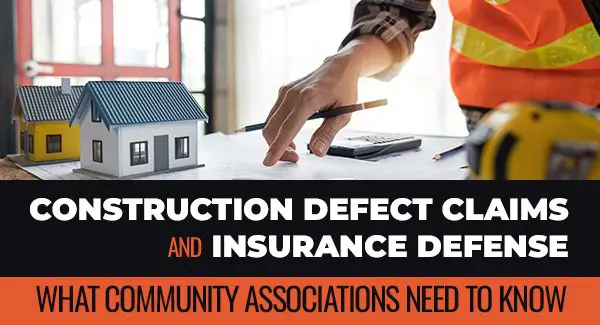- Community Associations, Insurance, Litigation
- Wisconsin, Indiana, Illinois, Florida
Condominium, homeowner (HOA), and townhome community associations can face construction defect issues that can lead to costly legal disputes. Defects in design, workmanship, or materials can cause significant property damage and safety concerns that can leave associations to navigate repair costs, resident complaints, and potential litigation.
By understanding how insurance coverage applies, the role of builder warranties, and best practices for handling legal disputes, boards can take proactive steps to safeguard their communities.
Common Construction Defect Claims in Community Associations
Construction defects can arise from various issues related to the development and construction of the Association and its buildings and mechanical facilities, as well as the repair, maintenance and replacement of the Association buildings and mechanical facilities, including:
- Structural Deficiencies – Cracks in foundations, load-bearing walls, or framing issues that compromise the integrity of buildings.
- Water Intrusion and Improper Drainage – Leaks caused by faulty roofing, poorly sealed windows, or defective drainage systems that can lead to mold growth and property damage.
- Defective Materials – The use of substandard or improperly installed materials such as siding, stucco, or plumbing components that fail prematurely.
- Electrical and Mechanical Failures – Issues with HVAC systems, wiring, or plumbing that create fire hazards, system failures, or water damage.
- Code Violations – Construction that does not meet local building codes or regulations, creating potential liability for the association.
- Breach of Contract – Construction work that does not comply with the terms of contracts that the Association has entered into, creating potential liability for the Association.
Construction defect claims can result in safety issues, as well as expensive repairs and legal battles. However, proper insurance coverage and experienced legal counsel can provide crucial protection and support in managing these claims effectively.
How Insurance Defense Helps Community Associations
When a community association faces a construction defect claim, various insurance policies may come into play to provide coverage and legal defense, including:
- General Liability Insurance – General liability insurance may cover damages resulting from construction defects, particularly if the defect leads to property damage or bodily injury. However, most policies exclude defects themselves and only cover resulting damage.
- Directors & Officers (D&O) Insurance – D&O insurance may protect board members if they are accused of negligence in handling construction defect issues or failing to act in the community’s best interest.
- Builder’s Risk and Developer Insurance – In cases where the community is still under developer control or recently transitioned, builder’s risk insurance or the developer’s general liability insurance may provide coverage.
If a claim escalates to litigation, insurance carriers often provide a legal defense, hiring attorneys to represent the association in negotiations or court proceedings. Insurers will assess whether the claim is valid and work to minimize financial exposure through settlements or defense strategies.
The Role of Builder Warranties in Construction Defect Claims
Builder warranties can provide another layer of protection for community associations dealing with defects. These warranties may cover specific aspects of construction for a defined period, including:
- One-year workmanship warranties covering defects in materials or labor
- Two-to-ten-year structural warranties addressing major structural defects in framing, foundations, and load-bearing elements
- Manufacturer warranties applying to appliances, roofing materials, plumbing, and other components
Before pursuing a legal claim, board members and property managers should review builder warranties with the association’s attorney to determine whether defects are covered. If a defect falls within a valid warranty period, the builder may be responsible for repairs, reducing the association’s financial burden. Given that these warranties have deadlines for making claims against the warranty, time is of the essence.
Best Practices for Handling Construction Defect Claims
To protect against construction defect liabilities, community associations should take proactive steps. Several best practices include:
- Conduct Regular Inspections – Identify potential defects early before they escalate into costly repairs.
- Document Issues Thoroughly – Keep records of defects, repair attempts, and communications with builders and contractors.
- Act Within Statutory Deadlines – Many states have strict time limits (statutes of repose and limitations) for filing claims related to construction defects. Acting quickly is critical.
- Legal Review – Work with the association’s attorney to determine what steps need to be taken to ensure insurance coverage aligns with relevant laws and that maintenance responsibilities are outlined in the community’s governing
- Review Insurance Policies – Work with an insurance professional to ensure the association’s liability coverage is adequate and what coverage applies to construction-related claims.
Legal Resource
Construction defects can pose significant financial and legal challenges for community associations. However, insurance coverage and defense strategies can help mitigate risks and costs. Board members should take a proactive approach by reviewing governing documents, monitoring construction quality, and working with insurance and legal professionals to address defects before they become major liabilities.
Additionally, work with experienced legal counsel that is familiar with the nuances of community association law. They can play a critical role on your association’s professional team in navigating construction defects issues and developing insurance defense strategies.
Do not hesitate to contact our law firm if your association has questions about community association construction defects, liability issues, warranties, insurance defense, litigation, or other legal concerns.
Please call 855-537-0500 or visit www.ksnlaw.com.
Since 1983, KSN has been a legal resource for condominium, homeowner, and townhome associations. Additionally, we represent clients in real estate transactions, collections, landlord/tenant issues, and property tax appeals. We represent thousands of clients and community associations throughout the US with offices in several states including Florida, Illinois, Indiana, and Wisconsin.
Please note the material contained in this article is for educational and informational purposes only and does not constitute legal advice. No attorney-client relationship is established by your review or receipt of the information contained in this article. You should not act on the information discussed in this article without first obtaining legal advice from an attorney duly licensed to practice law in your State. While KSN has made every effort to include up-to-date information in this article, the law can change quickly. Accordingly, please understand that information discussed in this article may not yet reflect the most recent legal developments. Material is not guaranteed to be correct, complete, or up to date. KSN reserves the right to revise or update the information and statements of law discussed in the article at any time, without notice, and disclaims any liability for your use of information or statements of law discussed on the article, or the accessibility of the article generally. This article may be considered advertising in some jurisdictions under applicable law/s and/or ethical rules/regulations. © 2025 Kovitz Shifrin Nesbit, A Professional Corporation.



